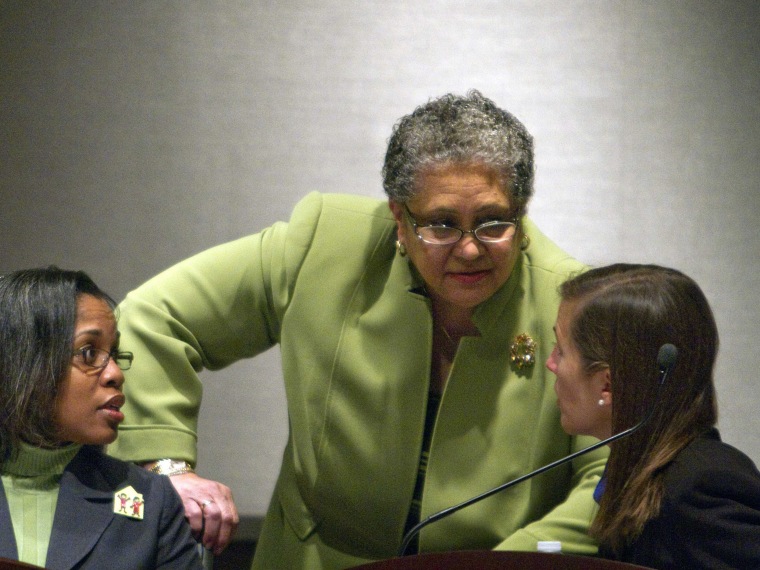The long-simmering cheating scandal in Atlanta public schools exploded Friday when a Fulton County Grand Jury indicted former Atlantic Public Schools Superintendent Beverly Hall and 34 other education professionals in the school district. According to a statement from the office of the Fulton County District Attorney, the indicted parties allegedly "conspired to either cheat, conceal cheating or retaliate against whistleblowers" in order to boost the school district's scores on Georgia's Criterion-Referenced Competency Tests (CRCT).
Prosecutors say that the educators cheated on the CRCT in order to reap "the benefit of financial rewards associated with high test scores." Under No Child Left Behind (NCLB), school districts which turn in low standardized test scores could be seriously penalized and even lose federal aid. Critics of NCLB and other recent school reform measures argue that the Atlanta cheating scandal is not an isolated incident of criminal activity.
"We don't condone cheating, but when you have high-stakes testing, which are one-shot deals that don't tell you whether a child is going to fail or succeed, the whole setup in terms of No Child Left Behind was unfair to children, unfair to educators," Verdaillia Turner, president of the Georgia Federation of Teachers said to msnbc Monday.
Since NCLB, signed in 2001, first mandated high-stakes testing in every state and tied it to federal funding, a wave of cheating scandals has swept the nation. In 2011, USA Today investigated standardized test scores in six states and Washington, D.C., and found "1,610 examples of anomalies in which public school classes—a school's entire fifth grade, for example—boasted what analysts regard as statistically rare, perhaps suspect, gains on state tests."
Months later, education reporter Dana Goldstein argued that "the most egregious practices in Atlanta...are part of a national, and indeed a historic trend, one that is bolstered by No Child Left Behind's emphasis on pressuring educators to produce spectacular test results."
In Georgia, the pressure to hold onto federal funds may have been exacerbated by state-level defunding of the education system. According to the Center on Budget and Policy Priorities, Georgia has cut education spending per student by 14.8% since 2008. The Chatatanooga Times Free Press, a local paper from the neighboring state of Tennessee, reports "public education in Georgia has missed out on $5.5 billion in funding since 2003 because of the General Assembly's austerity cuts."
As superintendent of Atlantic Public Schools, Beverly Hall was ruthless in her pursuit of higher test scores and the rewards that came along with them. According to the New York Times, "Dr. Hall permitted principals with the highest test scores to sit up front near her, while sticking those with the lowest scores off to the side, in the bleachers." Ninety percent of the district's principals were fired during Hall's decade-long tenure.
But Turner, whose union does not represent principals, had slightly fonder memories of Hall's management style.
"She expected high performance, but Dr. Hall protected her teachers, and we knew that," she said. "Her management style was more direct to administrators, and she required administrators to do their jobs."
In 2009, the American Association of School Administrators (AASA) named Hall the National Superintendent of the Year. In a statement, AASA executive director Dan Domenech said Hall had "turned Atlanta into a model of urban school reform."
"Throughout her long and successful tenure in Atlanta, Hall has accomplished significant gains in student achievement," he said. "She has demonstrated a commitment to setting high standards for students and school personnel, working collaboratively with the school board, and meeting the needs of the local community."
